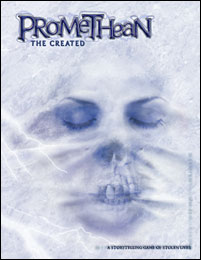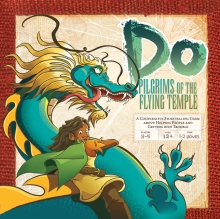“The best way to plan a chronicle’s size is to come up with a number of sessions or months you’d like to lead it as a Storyteller, then reduce that by 20 percent.”
—Promethean: The Created, by Bill Bridges, Conrad Hubbard, et al.
Chapter 4: “Storytelling and Antagonists”
Everything ends, no matter how we may wish otherwise. Roleplaying games are no different. Sure, there are plenty of stories of twenty-year-long campaigns of Dungeons & Dragons to be heard; you might even know of or participate in one yourself. If so, congratulations! By and large, though, most games will end in a few months to a handful of years. Groups dissolve. Stories reach an end and have few other places to go. It is the way of things.
There are games out there that do not wait for the end to either blindside or creep up on the players. They often avoid the sweeping, epic scope of the “campaign” that is so familiar to Dungeons & Dragons and similar RPGs. These games are small affairs: sometimes filled with whimsy, sometimes bittersweet, and almost always with something to say.
I’m going to talk about those kinds of games for a short while. Then we’ll end.
As we must.
Inevitability
“Here’s what I do know: most of the world thinks being good for goodness’ sake isn’t good enough. People you help will turn on you. People you love will manipulate you. And sometimes it seems everyone in the world is more sure of their beliefs than you. That’s this game, in a nutshell.“
—They Became Flesh, by Elizabeth Shoemaker Sampat
“Author’s Notes”
Promethean: The Created from White Wolf, Dō: Pilgrims of the Flying Temple by Daniel Solis, and the upcoming They Became Flesh by Elizabeth Shoemaker Sampat are all great RPGs that have a goal in mind.

Promethean: The Created
In Promethean, your character is a Frankenstein’s monster—cobbled together from the parts of the dead, instilled with life through unspeakable forces, and reviled by all that is proper and natural in this world—who seeks to find humanity. The Pilgrims of the Flying Temple are young kids with good intentions and a penchant for getting into all kinds of mischief as they help out with problems both comically absurd and touching, who eventually grow up and find their destiny. Players assume the roles of fallen angels in They Became Flesh, and are torn in several directions between God, Humanity, and their fellow Fallen, making decisions that inevitably edge them ever closer to their final judgment.
An RPG with a clear end goal has a great advantage: focus. Knowing what that goal is, and being aware of the in-game steps you must take to influence the outcome, gives a you a greater impact on the story of your character.
Admittedly there is nothing preventing players and GMs from collaborating like this in other games: Dungeons & Dragons, Vampire: The Requiem, Savage Worlds… In fact, Promethean’s method is quite similar to this. Mechanically it plays much like any other World of Darkness RPG; the main difference is it explicitly acknowledges its intention for an ending, and roughly how you should approach that as a player or as a GM.
Dō and They Became Flesh have more intrinsic approaches: the resolution mechanics contribute, bit by bit, toward a character’s eventual destiny.
Each time a Fallen uses his or her traits in They Became Flesh, there is a minimum number of dice the player must use. The player can roll any amount of dice they wish beyond that. Roll doubles, and those dice leave the pool forever, locked to an ability. A player never gets more dice. When they run out, the Fallen is judged, the outcome decided by where the dice have ended up.

Dō: Pilgrims of the Flying Temple
Whenever a pilgrim of the Flying Temple tries to help someone, or get out of trouble, the player draws differently-colored stones out of a bag and his or her choice between them decides the outcome. The stones a player chooses are tallied at the end of every session, and added to an overall total. If the pilgrim is retired at the end of an adventure, the totals of those stones determine what he or she goes on to do.
These are excellent mechanics, because they give a player direct control over his or her character’s path, while still giving a nod to the whims of chance. A player could certainly go with the “right decision” at any given moment and just find out where they end up as a result, but there is also the option to sculpt a character’s long-term path, fraught with short-term complications.
In doing so, each of these games says something. Perhaps more powerfully, each of them allows you to say something, through your choices.
Destiny
“One day, your pilgrim will end her pilgrimage. The many little decisions along the way will culminate in her fully realized destiny.”
—Dō: Pilgrims of the Flying Temple, by Daniel Solis
Chapter 4: “Advice”
Several years ago, when Dungeons & Dragons 4th Edition had not yet appeared on the radar, I played a paladin in my friend’s 3.5 game. The party was less a group of adventurers and more of an elite military force, subject to politics and orders from the top. We were sent to enlist the aid of pirates against an invading nation.
Arriving on their island, I immediately noticed the sheer debauchery of the pirates. Their lord had a harem, they dealt with slaves, murder was commonplace. My paladin bristled. Here was something he cared for not at all. In order to get their help, the pirates wanted our characters to eliminate the threat of some lizardmen who had been harassing them.
It turned out the island had once been home to the lizardmen, and they’d been displaced and slaughtered by the pirates. I knew what the right thing was for my paladin to do. Alas, I didn’t have that option. It came down to diplomacy with the lizardmen, or combat. At the very least I was able to choose the diplomatic solution. Staging a full-scale rebellion and overthrowing the pirates would have, to put it gently, derailed the entire focus of the campaign.
My friend wasn’t a poor GM, though obviously there was some room for player-GM collaboration in the situation. Sometimes you get overwhelmed. Sometimes you put a lot of work into something and want to see it happen. I don’t blame him, but at the same time I’m sad I didn’t have the opportunity to have my character take the path I felt most appropriate to him.
Games like the ones I’ve mentioned here tell you what kind of endings you can expect to see. It may sound restricting, but they do an incredible job of giving you, the player, leeway. They encourage, even demand player-GM cooperation, or provide an engine that drives the story forward to its various conclusions. They set the stage and say, hey, do something with all this.
Personally I’m a huge fan.
Other Games
It’s hardly my intention to imply these are the only three games that do what they do. None of them float your boat? Perhaps these will suit you:
Blowback by Elizabeth Shoemaker Sampat
This modern television spy action-thriller stuff-goes-wrong game encourages episodic gameplay (via “jobs”), while still having a sense of connection (through the relationships your characters develop and the answers they seek to find). The mechanics drive each job toward its end, while like Promethean, the long-term end is an encouraged matter of agreement between players.
Polaris: Chivalric Tragedy at Utmost North by Ben Lehman
Polaris is a melancholy game about a tragic, beautiful people who lived in a time before. Their civilization lies not in ruin, but in void. Nothing remains. You will die, or you will become what your people fear most. Your character will be torn in many directions and will accumulate scars of weariness and heartache, driving them ever-toward their unfortunate destiny.
My Life with Master by Paul Czege
The players collaboratively create a mad scientist, magician, or what have you, then suffer under his or her infernal whims as Igor-like assistants who crave companionship, love, and all those things they are denied. Eventually one will successfully resist the yoke of the Master, pushing everyone into an endgame culminating with the Master’s death.
Did I miss any? I can guarantee it. Hook us up in the comments.


Amen.
Personally, I think that endings give the story that’s gone before meaning. I remember that I learned this lesson, as applied to RPGs rather than other media, through Promethean. The idea that the system encouraged a clear endgame, though didn’t specify how you might arrive there, was compelling and interesting to me. To date, one of the best games I’ve ever run was a Promethean game that began with an idea of an ending—at least, an ending question.